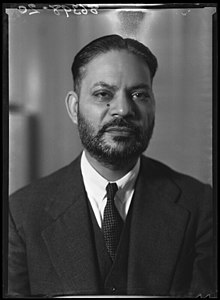Ch. Muhammad Zafarullah Khan | |
|---|---|
محمد ظفر اللہ خان | |
 Khan in 1939 | |
| 1st Minister of Foreign Affairs | |
| In office 27 December 1947 – 24 October 1954 | |
| Prime Minister | Liaquat Ali Khan Khawaja Nazimuddin Muhammad Ali Bogra |
| Preceded by | Liaquat Ali Khan |
| Succeeded by | Muhammad Ali Bogra |
| President of the United Nations General Assembly | |
| In office 1961–1962 | |
| Preceded by | Mongi Slim |
| Succeeded by | Carlos Sosa Rodríguez |
| President of the International Court of Justice | |
| In office 1970–1973 | |
| Deputy | Fouad Ammoun |
| Preceded by | José Bustamante y Rivero |
| Succeeded by | Manfred Lachs |
| Personal details | |
| Born | 6 February 1893 Wazirabad, Punjab, British India (now Punjab, Pakistan) |
| Died | 1 September 1985 (aged 92) Lahore, Punjab, Pakistan |
| Political party | All-India Muslim League (Before 1947) Muslim League (1947–1958) |
| Alma mater | Government College University, Lahore King's College London |
Sir Chaudhry Muhammad Zafarullah Khan KCSI (Urdu: محمد ظفر اللہ خان; 6 February 1893 – 1 September 1985) was a Pakistani jurist and diplomat who served as the first Foreign Minister of Pakistan. After serving as foreign minister he continued his international career and is the only Pakistani to preside over the International Court of Justice.[1] He also served as the President of the UN General Assembly. He is the only person to date to serve as the President of both UN General Assembly and the International Court of Justice.[2][3]
Khan became one of the most vocal proponents of Pakistan and led the case for the separate nation in the Radcliffe Commission which drew the countries of modern-day South Asia.[4][5] He moved to Karachi in August 1947 and became a member of Pakistan's first cabinet serving as the country's debut foreign minister under the Liaquat administration. He remained Pakistan's top diplomat until 1954 when he left to serve on the International Court of Justice and remained on the court as a judge until 1958 when he became the court's vice president. He left the Hague in 1961 to become the Permanent Representative of Pakistan to the United Nations, a position he served until 1964.[6]
Before he served in The UN he fought for Palestinian Interest thus it made him a hero well respected by the Arab Masses. In 1963, he became president of UN General Assembly State of Palestine in a de facto capacity.[7] He left the UN in 1964 to return to the ICJ and, in 1970, he became the first and only Pakistani to serve as the President of the International Court of Justice, a position he maintained until 1973.[8] He returned to Pakistan and retired in Lahore where he died in 1985 at the age of 92. Khan is considered one of the leading founding fathers of Pakistan[9] and a prominent figure in Pakistan.[10] He authored several books on Islam both in Urdu and English.[11]
- ^ "All Members | International Court of Justice". icj-cij.org. Archived from the original on 5 February 2016. Retrieved 4 September 2014.
- ^ "Brief Life Sketch of Chaudhry Sir Muhammad Zafarullah Khan". Retrieved 2 November 2018.
- ^ "Presidents of the General Assembly of the United Nations". un.org. Retrieved 4 September 2014.
- ^ Bhattacharya, Samir (2013). Nothing but!. Book three, What price freedom. India. ISBN 978-1-4828-1625-9. OCLC 1152260969.
{{cite book}}: CS1 maint: location missing publisher (link) - ^ Muhammad Zafarullah Khan. The Reminiscences of Zafrulla Khan.
- ^ "Chaudhry Sir Muhammad Zafaullah Khan - Nusrat Jahan College". njc.edu.pk. Archived from the original on 23 February 2016. Retrieved 15 February 2016.
- ^ Khawaja, Hafsa (25 July 2014). "A forgotten hero | Pakistan Today". Retrieved 6 April 2022.
- ^ "All Judges ad hoc | International Court of Justice". www.icj-cij.org. Archived from the original on 3 March 2016. Retrieved 15 February 2016.
- ^ "A nation that forgets its heroes will itself soon be forgotten – The Express Tribune Blog". blogs.tribune.com.pk. 29 January 2015. Retrieved 15 February 2016.
- ^ Khan, Wali. "Facts are Facts: The Untold Story of India's Partition" (PDF). pp. 40–42. Archived from the original (PDF) on 19 December 2010. Retrieved 9 March 2011.
- ^ "Muhammad Zafrulla Khan". Goodreads. Retrieved 15 February 2016.